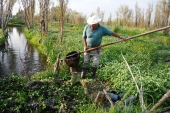I'm thinking about best strategies for capturing and retaining water in our 5 acre swaled food forest/orchard area. Here in coastal BC, there is ample water supply on an annual basis, but almost all of it falls in winter, and in recent years there's been unprecedented heat waves and months without rainfall in summer. Capturing and retaining the winter rainfall/snow is definitely the key to summer survival of plants.
The soil is sandy and rocky (sandstone) with very little organic water holding capacity. In the three years we've had the property we've been working to improve the organic matter of the soil with cover crops, chicken tractors, addition of organic material such as manure, plant trimmings and wood chip mulch, and biodiverse understory plantings to shade/protect the soil. We mostly have the wood chip mulch in rings about 1 yard in diameter around our young trees, starting about 6 inches out from the trunk of the tree. More mulch would be nice, but we can't easily source enough to wood-mulch the whole area.
We do water as possible during the worst of the heat waves but it's challenging given the size of the area and the amount of water available. We hope to get to a point where we can hold enough of the winter's water to get through the dry season without providing additional water.
One strategy that might help condense and/or hold water that I feel we haven't utilized to its full potential is adding more large rocks around the trees or in the swale ditches. There are plenty of rocks on our land but relatively few large slabs - mostly broken up sandstone pieces typically around the size of a fist or maybe double that size. I try to throw those out of the alleys between the rows of trees into the swales, to help shade the bottom of the swales and limit evaporation. I don't think these pieces of rock would be particularly effective to promote condensation of water - I think they may be too small. Does the temperature of rocks this size follow air temperature too closely to be effective as moisture condensers? I picture rocks the size of a soccer ball being optimal for this purpose - is that right? I wonder though whether the smaller rocks would work better for this if I can get enough of them to form two or more layers of rocks in the ditch. That could be feasible with a long term rock picking effort, maybe achievable over a few years.
All of these things are helping, but are not enough. We still end up losing trees and understory plants (one could consider this selection pressure and survival of the fittest, I suppose). We've definitely selected the most drought tolerant of our trees during these three years of crazy heat and drought. The ones that are thriving are really green through the summers although I feel their above-ground growth is slower than expected - hopefully, we are in the phase where most of their energy is going into getting their roots down through the sandstone to water. We plan to plant more that we've started from seed to fill in some of the gaps; I'd like to give these the best chance of survival so I'm trying to think how to get the biggest bang for our buck in terms of interventions. What I mean by that is: we have limited time and funds to improve water capture and retention. What is the most effective approach?
I don't think these are mutually exclusive approaches, and we will likely continue to work on all of them, but I'm curious to hear what others think are best practices in this situation:
- increase organic matter of soil
- increase living cover of soil
- extend the coverage/thickness of wood chip mulch on the planting berms
- incorporate other mulches on the planting berms
- add more mulches in the swale ditches, and if so, which kind
- add more rocks, or larger rocks, for water capture through condensation - if so, should these be on the berms or in the ditches
What else?










